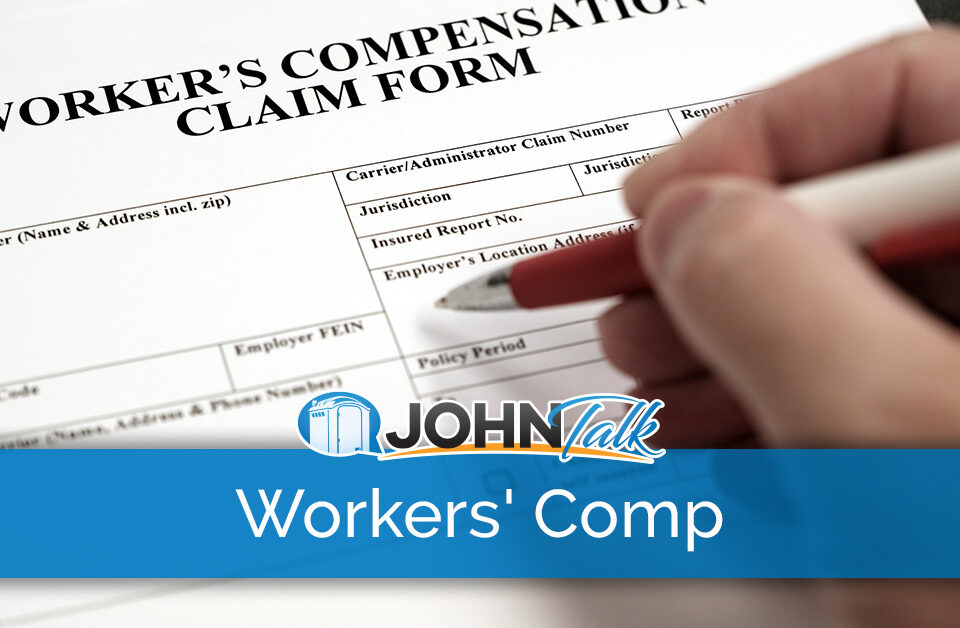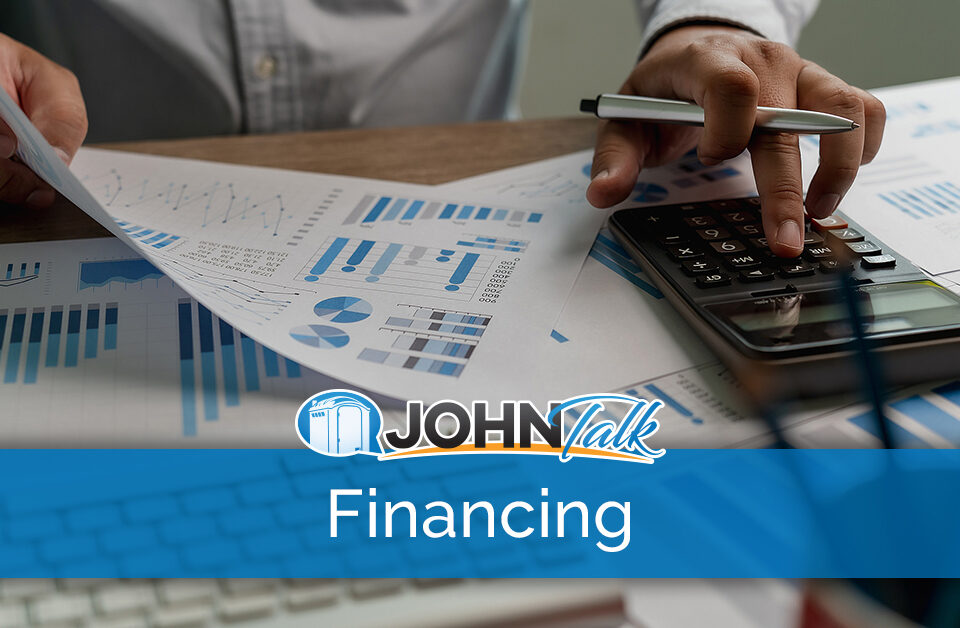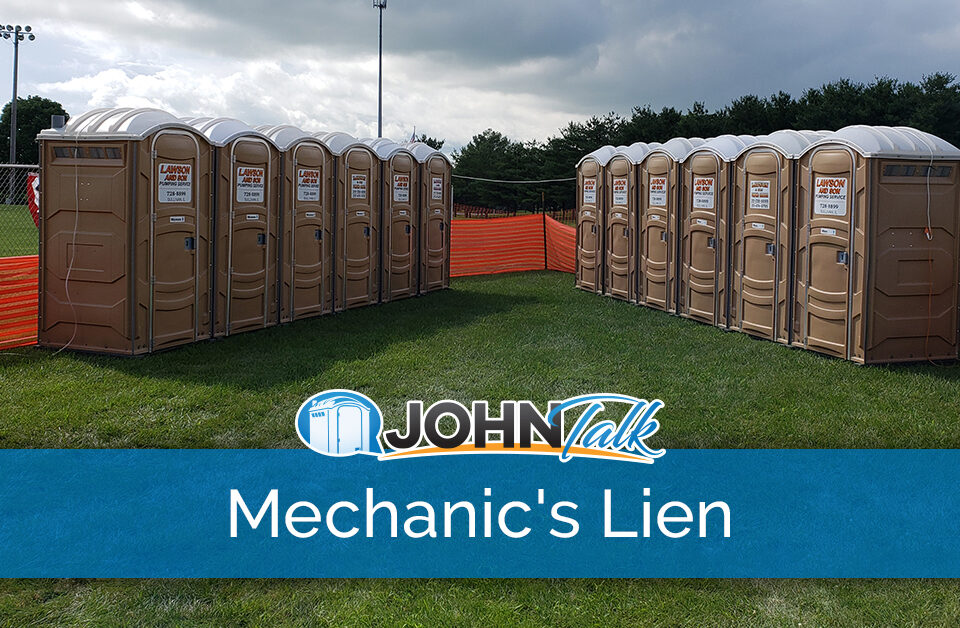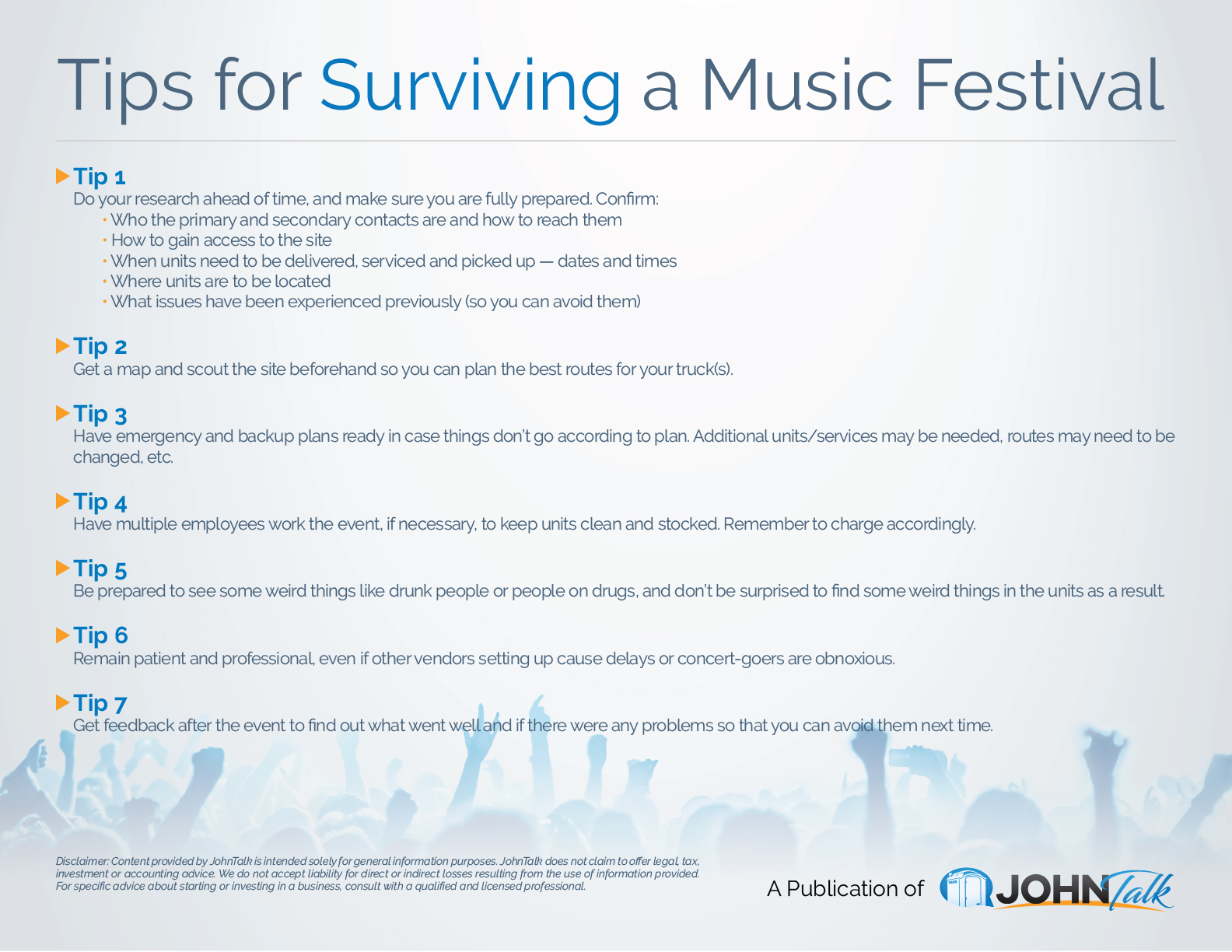
INFOGRAPHIC: Tips for Surviving a Music Festival
July 9, 2018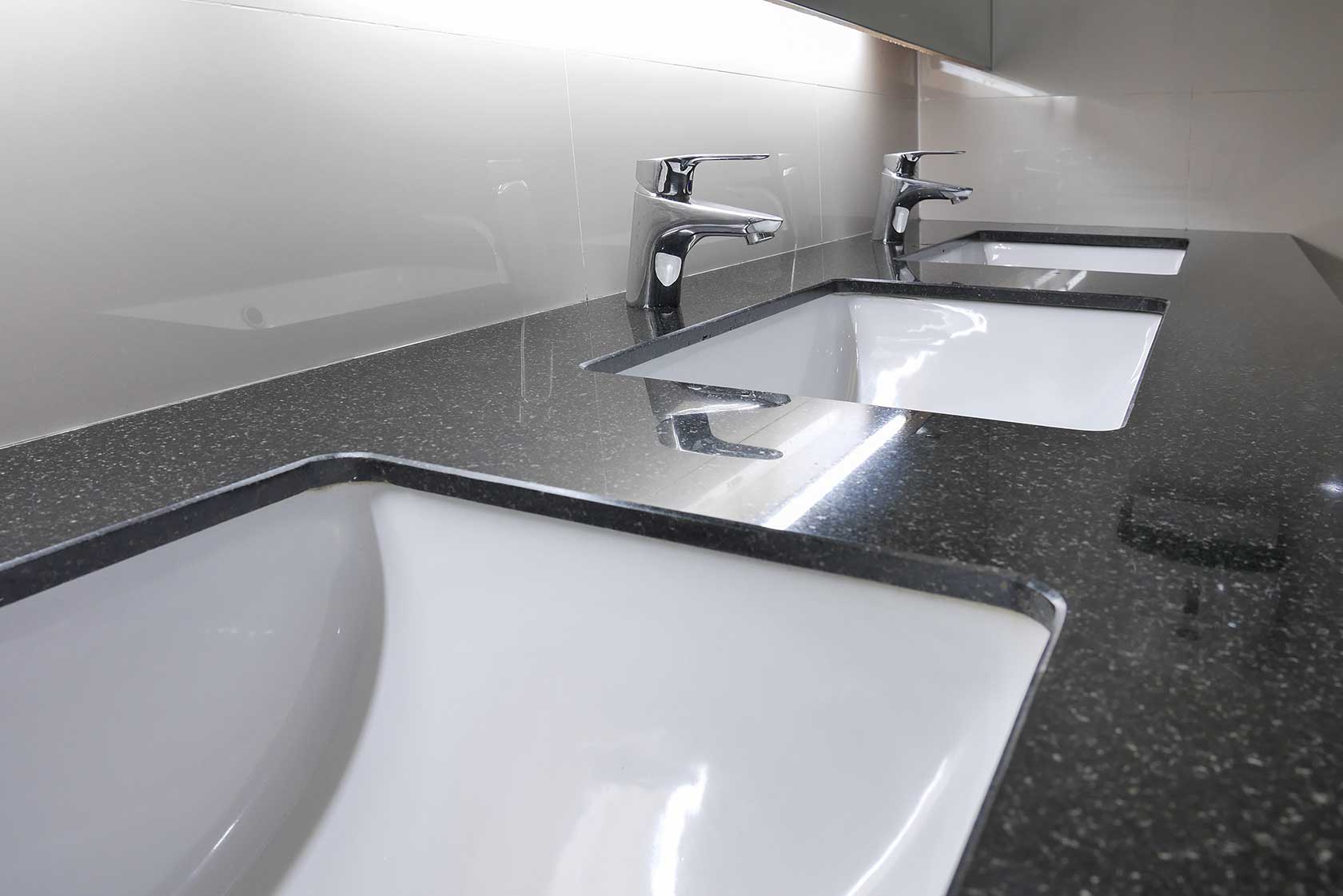
Increase the Appeal of Your Restroom Trailers
July 11, 2018Licenses and permits – don’t start your business without them! Understanding regulations – it’s a must!
Licenses, permits and regulations are a fact of life for the portable restroom operator as they are for any business owner. Licenses and permits are a legal obligation. Businesses that try to operate without the proper licenses and permits are breaking the law, and the results can be fines and even having the business shut down. Don’t be that business owner!
But it’s also to your advantage to have all applicable licenses and permits because it’s good marketing. A license or permit tells your customers that you are a professional who respects and follows the rules. Licenses and permits help protect the public from unscrupulous operators. It’s one of the first steps you take as a business owner to create a relationship of trust with your customers. Vendors and suppliers know that you are running a legitimate business.
Understanding regulations is a similar situation. Knowing and following regulations not only protects your customers, the public and the environment, it’s essential to keeping your business running smoothly. Having a thorough knowledge of regulations can help you help your customers as well.
When you’re ready to start your own portable sanitation business, you have to assume the responsibility of obtaining the proper permits and licenses. It’s all up to you! Because industry requirements can vary by city, county and state, you’ll have to do research. You’ll have to visit the municipal, county and possibly state offices. You’ll have to visit dump sites. They won’t come to you, and they won’t notify you.
Fortunately, most licenses and permits are not expensive. Most must be renewed only annually or every two years.
Work Your Way Up
A rule of thumb for obtaining the proper licenses and permits is to start with the city (municipality), then move up a level to the county, then state.
Most cities and counties have a website that you can research for permit and license information, but you will have to go in person to the offices to complete the transactions.
You will have to check with every city in which you do business. Even if you just drive though a city to go someplace else, check out that city, as some municipalities require a permit for businesses to drive a truck on their streets.
Take the time to get all the information you need. You’ll find that most city, county and state clerks are very knowledgeable since they deal with this aspect of business almost every day.
All states have comprehensive websites to guide you, as well as phone numbers, email or even live chat to contact for more information. You can get a quick start at the federal government website https://www.usa.gov/states-and-territories to find contact information for each state or U.S. territory. The site can also help connect you to local governments as well.
The Small Business Administration is also an excellent source of information and counseling on all aspects of licenses, permits and regulations as they apply to your small business. You can find the nearest local SBA district office at https://www.sba.gov/content/find-local-sba-office.
Business Licenses
Your portable sanitation company must be licensed by the state in which your business is located. If your service area covers more than one state, you must be licensed separately in each. You may also have to get licenses from counties or cities. Your business license fees will vary.
According to the SBA, one of the biggest reasons business owners need licenses is so the government can track revenue for taxation purposes. So, if you don’t have your license or forget to renew it, you can have tax problems. A license does offer advantages, however. For example, having your license is a requirement if you want to become an accredited business with the Better Business Bureau. In fact, the BBB offers these three reasons why it’s a good idea to have a business license:
1. Gives you personal protection
Registering your company name protects you from personal liability if your business is involved in an accident. Or, if you are sued for a personal reason, your company is protected.
2. Tax filing
With a licensed business, your business taxes and personal taxes are filed separately. You are able to deduct business expenses.
3. Networking
Joining organizations and associations is an excellent means of networking and building professional relationships. Many require your business to be licensed before you can join.
Start the process of obtaining your business license by researching your state’s website. Licensing sounds complicated, but each state gives you all the information you will need.
Look for a business section or one that specifically refers to licenses. States issue many types of licenses, and every state has its own rules and regulations concerning licenses, so make sure you are correctly focusing on business licenses. (For example, the state of Indiana notes that it has more than 400 different licenses, permits, certifications and other permissions to choose from.) If your service area covers more than one state, you must be licensed separately in each.
You may also have to get licenses from cities or counties. Municipal and county websites will help you determine exactly what is required, based on the location of your business. While you are visiting the city and county offices to obtain your licenses, it’s also a good opportunity to find out about other business-related matters, such as zoning ordinances and sign permits (you may need a permit to display your business sign, and follow ordinances that restrict the size, location and other aspects of your signs).
Get the JohnTalk “ALL-ACCESS PASS” & become a member for FREE!
Benefits Include: Subscription to JohnTalk Digital & Print Newsletters • JohnTalk Vault In-Depth Content • Full Access to the JohnTalk Classifieds & Ask a PRO Forum
Commercial Driver’s License (CDL)
When you own a portable sanitation business, you will spend a lot of time in your truck. You’ll be driving on highways, city streets and gravel roads, backing in and out of job sites, maneuvering around obstacles and parking in difficult areas. You may have to drive through crowds of people. Your driving skills will be tested on the job almost every day. Even a single accident can be economically devastating.
Commercial driving demands a higher level of professionalism than public driving. Under certain circumstances, your superior driving skills and knowledge will be acknowledged by having a commercial driver’s license (CDL).
The pumper and flatbed truck(s) you drive for work determine whether or not you need to get a CDL, based on federal rules (in addition to state requirements) concerning the gross vehicle weight (GVW) of the truck.
Because you must pass a basic controls test and a road test, preparing for and earning your CDL will prepare you for the road ahead.
An excellent starting point for information is the FMCSA (Federal Motor Carrier Safety Administration) website on the Commercial Driver’s License Program at https://www.fmcsa.dot.gov/registration/commercial-drivers-license. FMCSA does not issue CDLs. State governments are responsible for issuing CDLs.
According to the FMCSA, you must have a CDL in order to drive certain commercial motor vehicles (CMVs). There are three license classifications:
Class A
Any combination of vehicles with Gross Vehicle Weight Rating (GVWR) of 26,001 lbs. or more, if vehicle is towing an excess of 10,000 lbs.
Class B
A single vehicle with GVWR of 26,001 lbs. or more, and vehicle is not towing an excess of 10,000 lbs. GVWR.
Class C
A single vehicle with GVWR of less than 26,001 lbs. or vehicle towing another vehicle that has a GVWR that does not exceed 10,000 lbs., which includes vehicles designed to carry 16 or more passengers with the driver, and vehicles used to transport hazardous materials.
When you begin the process of obtaining your CDL, the first step is to get a copy of your state’s Commercial Driver’s License manual. Each state has its own, so don’t use a manual from another state to prepare for the test. Many states have their manuals available online that you can download.
Just like the first time you applied for a driver’s license, you need a learner’s permit. A Commercial Learners Permit (CLP) authorizes you to practice on public roads with a qualified CDL holder. It also requires some background information to qualify you:
- Driving record — Your driving record is checked for the last 10 years in all 50 states and the District of Columbia.
- Medical qualification — Most commercial driving requires a Department of Transportation (DOT) medical card, requiring a DOT physical.
- Identity and proof of residency — Some states require documents to prove your name and state residency.
There are fees for getting your CLP.
You must have the CLP for 14 days before taking the CDL test. It’s highly recommended that you use this time to practice (with a qualified CDL holder). Some states even require the successful completion of CDL training before testing.
Schedule your test with your state’s Department of Motor Vehicles (DMV). In order to get your CDL, you’ll have to pass all three parts of the test: the vehicle inspection test, the basic controls test and the road test. You will be able to find DMV information for your state online.
Going Non-CDL
Many PROs prefer to operate with non-CDL trucks (under 26,001 pounds). Among the reasons for doing so are less expensive insurance, less expensive operating costs and less potential damage to roads and driveways.
Other operators prefer owning a larger truck (requiring a CDL) because of the convenience of larger capacity. You can cover more customers over the course of a single route.
When buying a truck, check its GVW rating. The weight is based on the truck with a full load. But loads do vary, so be careful. When transporting a full load, you might be over the weight limit and not know it. To estimate the additional weight in pounds a full load adds to a truck, multiply the number of gallons the tank holds by 8.5 or 9 because septage weighs about 8.5 to 9 pounds per gallon.
For knowledgeable and person-to-person advice on CDLs, talk to the manufacturer’s sales representative about CDL requirements when purchasing a truck.
USDOT Number
Your vehicle(s) may need a USDOT Number (U.S. Department of Transportation). Many states require it. For more information, visit the Federal Motor Carrier Safety Administration (FMCSA) site at https://www.fmcsa.dot.gov/registration/do-i-need-usdot-number. Furthermore, USDOT requires vehicles with a GVW of 10,000+ pounds to undergo an annual inspection.
You may also need a state-sanctioned environmental agency number as well. Again, you will be able to find additional information on your state website.
Dumping Permits
Most of your days in portable sanitation will end at the same place – the dump site. The disposal of waste, often called “dumping,” takes place at wastewater treatment plants, or “dump sites.”
You will need a separate permit for every dump site you use. Get to know your dump sites – they are not all alike!
First, find the sites in or nearest to your service area. You can find them by doing a Google Maps search (https://maps.google.com/). Under Search Google Maps, type in “wastewater treatment plants near me” or “wastewater treatment plants near ___” (a nearby city or area).
Choose several sites, then visit them for more information. Often, there will be a few steps before you can start dumping. You will probably have a vehicle inspection to verify your tank size. You may even have to take a safety class.
Permit prices may vary, but a typical current rate for waste disposal is about 8 cents per gallon. Some plants offer volume discounts. You’ll probably be able purchase disposal tickets in advance.
But cost is just one important factor to consider. Some wastewater treatment plants have different requirements and regulations on acceptable chemical and pH levels in the waste. Dump sites have their own capacity limits that may affect you. You may arrive at the end of a busy day only to find that the plant has maxed out on its limit and is unable to accept your load. That’s an unpleasant situation to face at the end of a long work day! It’s a key reason why it’s important to have solid business relationships with more than one site.
When choosing a disposal site, consider location and convenience as well. You may prefer a site that has a higher rate because it’s closer or there’s less “red tape” involved, making the process quicker and less expensive overall.
Finally, keep an eye on the time the dump sites are open. Some will stay open later than others or have weekend hours. Another service is emergency after-hours access, although this may cost you an extra fee.
Land Application: Do It Yourself
A less common but feasible alternative to dumping at wastewater treatment plants is to apply septage directly on land. The EPA website has a page “A Guide to the Federal EPA Rule For Land Application of Domestic Septage to Non-Public Contact Sites” at https://www.epa.gov/biosolids/guide-federal-epa-rule-land-application-domestic-septage-non-public-contact-sites.
Land application is the spreading of domestic septage on land at controlled rates to fertilize crops and improve the tilth of soils. This domestic septage can either be sprayed or spread on the soil surface, or plowed, disked or injected into the soil. The EPA has a policy that encourages the beneficial use of sewage sludge, including domestic septage.
Taking this course of action will require you to comply with many federal and state guidelines, and is limited to the application of domestic septage to non-public contact sites. Domestic septage is defined as the household, non-commercial, nonindustrial sewage removed from a septic tank cesspool, portable toilet, type III marine sanitation device or a similar system that receives only domestic septage. Non-public contact sites are sites not frequently visited by the public, including agricultural land, forests and reclamation sites.
“Domestic Septage Regulatory Guidance: A Guide to the EPA 503 Rule” (found on the web page) will introduce you to the requirements of land application. The booklet also provides a helpful contact list of state and regional septage coordinators.
Regulations
Your work in portable sanitation involves three aspects of daily living that touch all of us – sanitation, health and the environment. And portable sanitation intersects with many other aspects of commerce, especially construction, agriculture, transportation, recreation and entertainment.
There’s a lot riding on your services. Many people are affected. It’s important to our society that portable sanitation is handled in a safe, uniform manner, guided by appropriate state and federal regulations. Everyone needs to follow the rules.
Some regulations directly concern portable sanitation. Others regulate those industries that you service.
Most regulations, as they concern your business, involve the transport and disposal of waste, including the use of chemicals and how to handle spill occurrences. But there can be regs for many other aspects, such as requiring operators to attend a certification class or having a certain number of educational hours each year. Because you will be involved in work environments such as construction sites, there may be OSHA and EPA regulations to follow. Handicap-accessible access may involve ADA standards.
When you don’t follow the rules, you can be fined and even shut down. Knowing and following regulations not only protects your customers, the public and the environment, it’s essential to keeping your business running smoothly.
Check the government website of the state where your business will be located for up-to-date and accurate information on regulations. You will also find contact information for questions.
A valuable source of information is PSAI (Portable Sanitation Association International) at www.psai.org. PSAI has been a leader in establishing the standards that have greatly improved the reputation of the portable sanitation industry.
When you become a member of PSAI, you have access to:
- ANSI Standards (American National Standards Institute)
- OSHA Standards (Occupational Safety and Health Administration)
- ADA (Americans with Disabilities Act)
- EPA (Environmental Protection Agency) and the Office of Wastewater Management (OWM)
- DOT regulations (U.S. Department of Transportation)
Attending wastewater and portable sanitation events such as the WWETT Show is another recommended means of learning the ins and outs of regulations. Shows are valuable opportunities to network with the PROs who have dealt with regulations for many years. You can also network online through Facebook and other social media sites dedicated specifically to portable sanitation.
Keep Up the Good Work
Once you have all your licenses and permits, you’ll need to manage and maintain them. The SBA has the following advice:
- Keep track of renewal dates.
- Maintain a copy of all licensing applications and forms in your business records.
- Display your licenses or permits correctly. Most states and localities require businesses to prominently display their business licenses so customers can see them.
- If you expand your business, you may need additional business licenses.
Be Prepared to Educate
Your services can actually become more valuable to your customers as you gain experience with understanding regulations. PSAI notes that customers may have a lot of misconceptions about environmental safety requirements – the problem is not what they know, but what they think they know! For example, they may believe that containment trays are required, or that portable waste is hazardous waste and it’s not allowed on the job site.
Your advice can help customers save money and aggravation. Perhaps the hardest misconception to break is that portable restroom waste is “hazardous.” In fact, it is not categorized as “hazardous” by the EPA. It’s categorized as “domestic septage.” EPA regulations concerning hazardous waste don’t apply unless you are charging or cleaning toilets with substances categorized as hazardous.
In fact, PSAI states that the EPA doesn’t have national laws pertaining to portable restrooms. Instead, it offers guidelines about pollution on the construction job site. States and local governments make the actual laws.
At the state level, contractors are required to submit a Stormwater Pollution Prevention Plan (SWPPP) when applying for a construction general permit and have Best Management Practices (BMPs) to guide them. This is often where the confusion starts, as the customers use their own judgment to determine how best to fulfill the SWPPP.
So, your customer may decide a containment tray is “necessary” to meet EPA guidelines or may conclude that human waste is hazardous. Usually, customers are “erring on the side of caution,” but these precautions are what results in higher site maintenance costs.
Although environmental safety is a required aspect of the business, give your customers credit for their efforts to help keep the site safe and sanitary. Work with them to keep a clean site, and you both are doing your part to benefit the community. That’s the way regulations are supposed to work!
And if you can save money for your customers through your knowledge of the business, then you have likely strengthened your relationship, and they may look to you in the future as a trustworthy supplier. When you belong to local civic and trade organizations, businesses in the community will turn to you as an expert on the subject of regulations.
Looking to Take Your Portable Restroom Business to the NEXT LEVEL? Download our FREE Guide: “Your Guide to Operating A Portable Restroom Business.”
Thinking About GETTING INTO the Portable Restroom Industry? Download our FREE Guide: “Your Guide to Starting A Portable Restroom Business.”




